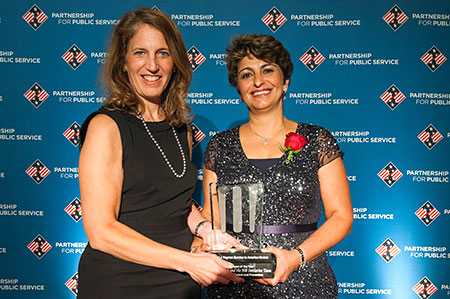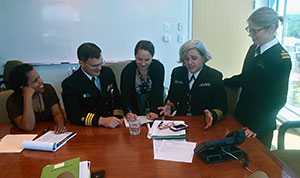Division of Bacterial Diseases (DBD) News Bulletin
Summer 2016, Issue 18

Photo: Dr. Hajjeh accepts the 2014 Federal Employee of the Year medal from HHS Secretary Sylvia Burwell for leading a global vaccine campaign (the Hib Initiative) estimated to save the lives of millions of children by 2020. This award recognizes annually a federal employee whose professional contributions exemplify the highest attributes of public service.
In This Issue
DBD Director Accepts WHO Position
DBD director, Rana Hajjeh, will be leaving CDC on July 1 to become the director of communicable diseases for the World Health Organization’s Eastern Mediterranean Regional Office in Cairo, Egypt.
Rana has made incredible contributions to public health in her 23-year career with CDC. She was the first permanent director of DBD and has led the center’s efforts on bacterial respiratory and vaccine-preventable disease surveillance and response efforts in the United States and globally for the last 8 years. She played an important role in the response and control of multiple domestic and global outbreaks, including epidemic meningitis, anthrax, SARS, cholera, MERS, and Ebola. Rana is probably best known for her leadership globally as director of the GAVI (Global Alliance for Vaccines and Immunization) Hib Initiative, a global campaign that convinced some of the world’s poorest countries to use Hib vaccine to fight bacterial meningitis and pneumonia. Hib vaccine is estimated to save the lives of millions of children by 2020. For these accomplishments, she was awarded the 2014 Federal Employee of the Year medal.
Top of Page
Photo: DBD and NCEH participated in a CDC telebriefing, hosted by CDC Director Tom Frieden, M.D., M.P.H, to discuss with media the Legionnaires’ disease Vital Signs. RDB chief, Cyndy Whitney (second from right), fielded questions from reporters, while the rest of the Legionella team (from left to right: Claressa Lucas, Jasen Kunz, Alison Albert, Laura Cooley) provided technical support.
June 2016 Vital Signs: Legionnaires’ Disease
DBD successfully launched its first CDC Vital Signs on June 7. The issue highlighted the latest findings on deficiencies in environmental control of Legionella that led to the building-associated Legionnaires’ disease outbreaks CDC investigated from 2000 through 2014. These investigations show that about 9 in 10 outbreaks were caused by problems that could have been prevented with more effective water management. Environmental assessments conducted as part of CDC investigations show that outbreaks of this disease were due to common problems, such as human errors like not properly cleaning a hot tub filter, or changes in water quality caused by external factors like nearby construction. Learn more about this Vital Signs issue.
In conjunction with Vital Signs, DBD, in collaboration with the National Center for Environmental Health, released a practical guide for Developing a Water Management Program to Reduce Legionella Growth & Spread in Buildings. This new toolkit, based on ASHRAE Standard 188, features a checklist to help identify if a water management program is needed, examples to help identify where Legionella could grow and spread in a building, and ways to reduce the risk of Legionella contamination. View the toolkit.
Top of PageDirector's Spotlight
This will be my last issue of the DBD Bulletin with you—my wonderful staff. After 23 amazing years at CDC, and 8 years as DBD director, I have accepted a position with the World Health in Egypt.
My career at CDC has been enjoyed tremendously—starting with my early days in emerging special pathogens and childhood and respiratory diseases, to mycotic diseases, NAMRU-3 (Egypt), the GAVI Hib Initiative, involvement in emergency responses, and in particular, my DBD years. As the division’s first permanent director, I learned a lot from seasoned scientists and staff, and from mentoring the many bright young scientists and new public health staff. DBD staff commitment to public health and strong science is unparalleled and its accomplishments will forever be a source of great pride for me. DBD’s work has high impact in the US and the rest of the world, helping to save millions of lives and contribute immensely to public health science. The division is in great shape, with more funding this year than ever, I am confident DBD will continue to shine and grow.
CDC and all my friends will be very much missed, but I am very excited about this new opportunity in a region currently facing many public health and other challenges. This is a region that I know well and one where I will be proud to pursue my passion in impactful global health. Being in Egypt will also allow me to be closer to my family in Lebanon.
The world is small and the need to protect the public’s health is everywhere, so I will look forward to collaborating with many CDC colleagues in the future.
"If you drink from the Nile once, you will come back." (Egyptian Proverb)
With all my love and appreciation,
Rana
- Page last reviewed: June 30, 2016
- Page last updated: June 30, 2016
- Content source:


 ShareCompartir
ShareCompartir